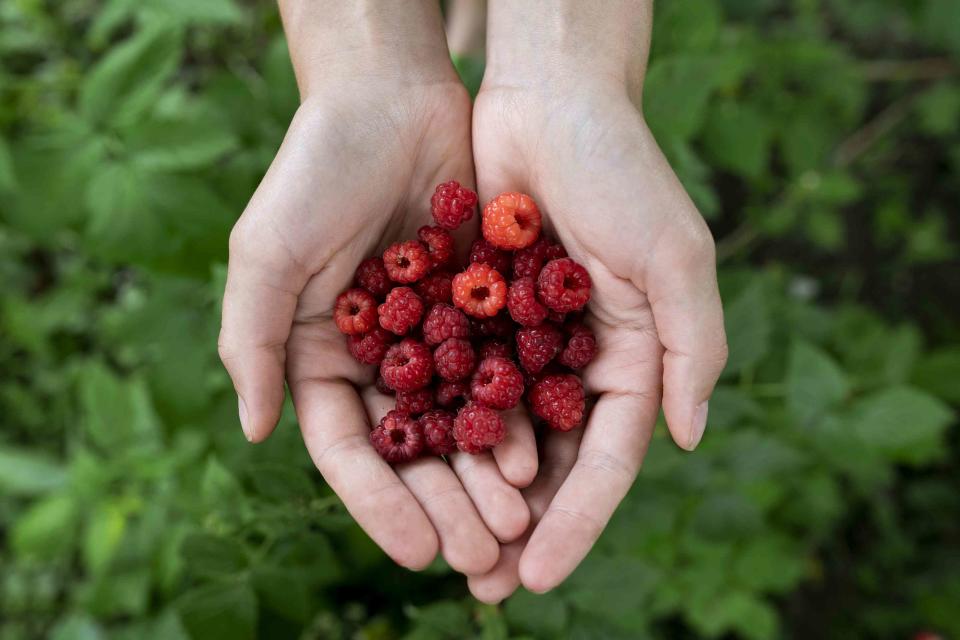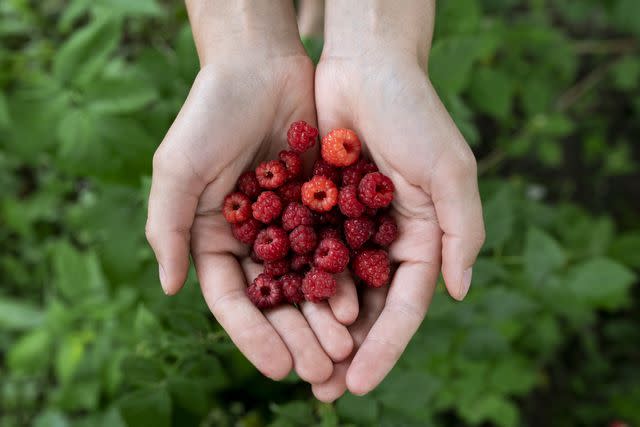Are Raspberries Good for You?
Health Benefits and Nutrition

Mykhailo Lukashuk / Getty Images
Medically reviewed by Allison Herries, RDN
Raspberries are one of the most popular berries in the world. These small, juicy fruits taste sweet and tart and offer many health benefits.
Raspberries come in different colors, including red, black, purple, and gold. Red raspberries are the most common type you’ll find at the grocery store. Raspberries can be eaten raw or added to smoothies, jams, baked goods, or other foods. In addition, the fruits contain vitamins, minerals, fiber, and antioxidants that may help fight disease.
This article discusses the health benefits of red raspberries, their nutrients, and how to incorporate these fruits into your diet.

Mykhailo Lukashuk / Getty Images
Benefits of Raspberries
Raspberries can offer various nutritional benefits and disease-fighting properties and are considered a superfood.
Disease Prevention
Raspberries contain high amounts of antioxidants and phytonutrients. Research suggests these substances may provide some protection against cancer. Additionally, anti-inflammatory compounds found in raspberries may help lessen your chances of developing other diseases.
Antioxidants are substances that can delay cell damage. Phytonutrients are compounds produced by plants that provide health benefits. While phytonutrients are only found in plant foods, antioxidants come from both plant and animal sources.
Diabetes Management
In one study, people at risk for diabetes who ate red raspberries reduced the amount of insulin they needed and had lower blood sugar levels. Raspberries contain a mineral called manganese, which is essential for promoting healthy bones and skin. It also helps the body regulate blood sugar.
A cup of raspberries contains 8 grams (g) of fiber. Studies show that consuming more dietary fiber may help lower your risk of developing type 2 diabetes. Foods that are high in fiber can make you feel fuller longer, which may promote a healthy weight.
Healthy Skin
Raspberries are packed with vitamin C. Your body needs this vitamin to produce collagen, a protein that promotes healthy skin and wound repair. Collagen is what gives your skin its structural support, elasticity, and hydration.
One cup of raspberries contains about one-third of your daily recommended vitamin C intake.
Eye Health
Research suggests consuming foods with the antioxidant zeaxanthin, found in raspberries, may help lessen a person’s risk of developing macular degeneration (an eye disease that causes blurry central vision). The high levels of vitamin C in raspberries are also known to protect against macular degeneration and cataracts (cloudy areas in the eye's naturally clear lens).
Digestion
Raspberries' high fiber and water content can promote a healthy digestive tract. Fiber is known to prevent constipation and provide a healthy gut environment. One study concluded that consuming higher amounts of dietary fiber could boost good bacteria in a person's gut.
Brainpower
A systematic review found that compounds called flavonoids, which are found in raspberries, may improve memory, coordination, functioning, and attention span.
Other research suggests that vitamins C and E in the berries may improve your recall of information as you age. People who get higher levels of these vitamins from their diets have a lower risk of dementia.
Heart Health
The antioxidants in raspberries may help reduce inflammation that leads to heart disease. Raspberries are also rich in potassium, which may protect against high blood pressure. Experts recommend consuming about 4,700 milligrams (mg) of potassium a day.
The fiber in raspberries can also protect against high blood pressure, high cholesterol, and obesity, risk factors for heart disease.
One cup of raspberries contains about 186 mg of potassium.
Raspberry Nutrition
Other berries, like blueberries, blackberries, and strawberries, also provide important vitamins and nutrients. Most berries offer health benefits, but the nutritional makeup of each type may vary. For instance, raspberries are richer in vitamin C, while blueberries are higher in vitamin K.
Essential nutrients found in one cup of red raspberries include:
Fiber: 8 g
Vitamin C: 32.2 mg
Potassium: 186 mg
Magnesium: 27.1 mg
Manganese: 0.824 mg
Vitamin E: 1.07 mg
Iron: 0.849 mg
Phosphorus: 35.7 mg
Dietary Tips
You should rinse raspberries in cool water before eating. Typically, fresh raspberries will last a couple of days in the refrigerator. You might want to freeze raspberries to preserve them longer.
Raspberries can be eaten raw, or you can add them to different recipes. The berries are commonly used as a topping on oatmeal, pancakes, or waffles. Or, you can mix them in a smoothie or a bowl of yogurt.
Raspberries can perish quickly, so they should be purchased one or two days before eating. It’s best to choose berries that are deep in color, plump, and firm.
Risks
Generally, raspberries are considered a safe, healthy food to consume. However, some people allergic to the fruit shouldn’t eat it. Talk to your healthcare provider if you have a food allergy.
Many fruits, including raspberries, can harbor harmful bacteria that cause food poisoning. Symptoms may include vomiting, diarrhea, and abdominal pain. It’s important to rinse raspberries thoroughly before consuming them.
For most individuals, it’s safe to consume raspberries daily. However, overeating any one food can result in digestive distress.
Pesticides
All fruits, including raspberries, can contain residue from pesticides. Experts recommend buying organic produce whenever possible.
Raspberry Ketones
Raspberry ketones are dietary supplements that include extracts from raspberries and other sources. Some people take ketones in hopes of losing weight or preventing hair loss. However, little evidence shows that raspberry ketones can benefit these conditions. You should talk to your healthcare provider before taking any supplement, including raspberry ketones.
Summary
Raspberries are a nutritious food choice that may help protect against various diseases. They contain different vitamins, minerals, and antioxidants known to ward off some of the most common medical conditions. Overall, raspberries are a safe food to consume, and incorporating more of these berries into your diet may be an easy way to boost your health.

